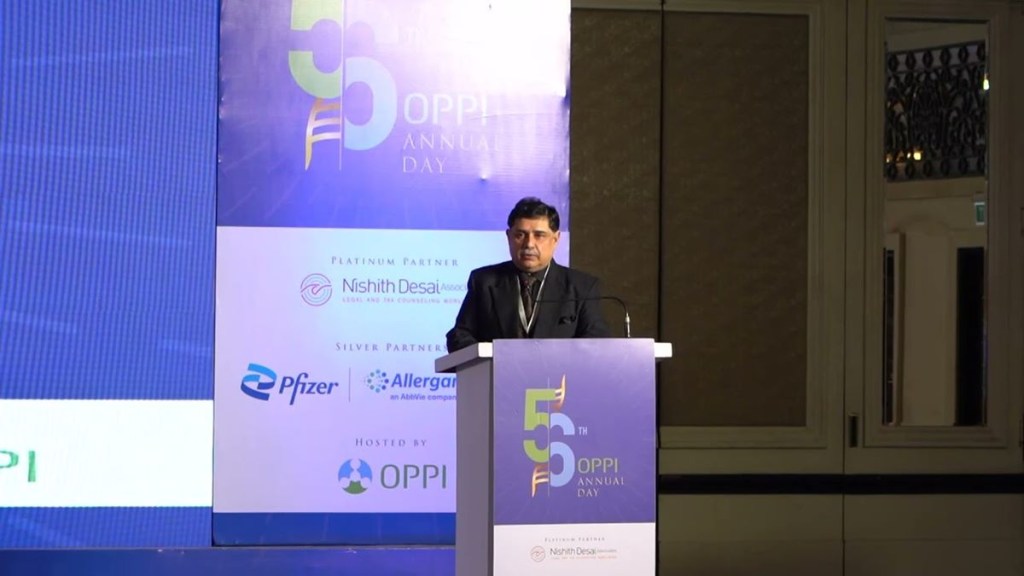Immunisation has played a crucial role in saving millions of lives every year. According to the World Health Organization (WH0), the world has now have vaccines to prevent more than 20 life-threatening diseases. Immunisation currently prevents 3.5-5 million deaths every year from diseases like diphtheria, tetanus, pertussis, influenza and measles, the global health agency revealed.
Financial Express.com reached out to Vivek Sehgal, Director General, Organisation of Pharmaceutical Producers of India (OPPI) and he talked about issues like immunisation in India, current surge in COVID-19 cases, and regulatory challenges for pharmaceutical companies among others. Excerpts:
How do you see the current surge in COVID-19 cases?
Given the current surge in cases, it is crucial that the public remains cautious and takes necessary precautions to keep COVID-19 at bay. This includes following basic preventive measures such as wearing masks, practising physical distancing, and regularly washing hands. Additionally, the public needs to be vigilant and stay informed about the latest developments related to COVID-19.
We appreciate the fact that the Government is already taking steps of mock drills and should take other necessary steps to contain the spread of the virus, including increasing vaccination coverage, ramping up testing and contact tracing, and ensuring that healthcare infrastructure is prepared to handle the surge (if any) in cases. The public needs to support these efforts by following guidelines and cooperating with healthcare officials in contact tracing and testing.
According to you, what are the challenges that India is facing with respect to immunisation?
India has made significant progress in increasing access to vaccines in recent years, but there are still challenges that need to be addressed to ensure that everyone receives the necessary vaccinations. OPPI member companies have played a vital role in developing and distributing vaccines in India. For instance, vaccines developed by our member companies are used in India to prevent diseases such as Covid-19, tuberculosis, hepatitis B, cervical cancer, rotavirus, pneumonia, and influenza, among others.
One of the significant challenges is the lack of information dissemination among the public regarding the importance of vaccination, preventive care, and completing the schedule of booster doses. There still exists vaccine hesitancy and low vaccine coverage due to low awareness of the benefits of vaccines. During the peak of the COVID-19 pandemic, people were vigilant about getting vaccinated and completing their doses. However, there has been a significant drop in vaccine and booster dose uptake in recent months, with many people not taking the booster doses that are now available.
While there has been significant progress in increasing access to vaccines in urban areas, there are still many rural areas where access remains limited. We also need to think through how accessibility to vaccinations can be enhanced, especially in rural areas.
Beyond the Covid-19 vaccines, we also need to disseminate information on the other vaccinations available in the country which can ensure a lesser health burden on the strained healthcare infrastructure. These vaccines both adults and children should also be an integral part of public health.
What has been the role of the pharmaceutical industry in the vaccination segment of India?
In terms of invention and innovation, the pharmaceutical industry and OPPI member companies have been at the forefront of developing new and improved vaccines to tackle various diseases and disorders such as polio, TB, hepatitis B, pneumonia, cancer, HPV, measles, influenza, pneumococcal, rubella, BCG, Covid-19, and meningitis, among others.
OPPI represents research-based pharmaceutical companies in India, and its member companies have developed several vaccines to tackle different diseases in the country.
These vaccines have been a marquee development in the sector and are critical in improving patient safety and preventing the spread of diseases in India. The pharmaceutical industry’s continued efforts in the research and development of vaccines have led to significant progress in the healthcare sector, benefiting millions of people in India and globally.
There is a rise in the burden of non-communicable diseases (NCDs) in India. How this can be an opportunity for the Indian pharmaceutical sector?
Preventive care measures, such as regular health screenings, lifestyle modifications, and immunizations, can help individuals manage their NCDs and prevent the onset of complications. The pharmaceutical sector can develop and manufacture drugs and vaccines that help prevent NCDs or manage their symptoms effectively. Furthermore, the pharmaceutical sector can also play a critical role in ensuring patient safety.
NCDs often require long-term treatment, and the drugs used to manage them can have adverse effects. It is essential to ensure that patients receive safe and effective medicines and that healthcare professionals prescribe and administer them correctly. The pharmaceutical sector can invest in research and development to produce high-quality, safe drugs and implement measures to ensure patient safety throughout the drug development process.
Lot of major blockbuster drugs will go out of patent this year. Some are already off-patent. How can this influence and drive the Indian pharmaceutical sector?
Skip answering.
With respect to drug approvals and regulations, what more needs to be done for the pharma industry?
To support and promote growth in the pharma sector, there is a need to create a conducive regulatory environment that encourages innovation and growth while ensuring patient safety.
One of the areas that require attention is the time taken for clinical trials. The regulatory process for clinical trials can be lengthy and complex process, leading to delays in bringing new drugs to the market. Streamlining the regulatory process and reducing the time taken for clinical trials could help in creating a more conducive environment for the industry.
Regulatory guidelines need to be streamlined, transparent, and consistent moving forward. A clear regulatory framework and transparent procedures for obtaining regulatory approvals would help in reducing uncertainty and promote investment in the sector. The Rule 101 provision, which allows for expedited approval of drugs that are already approved in other countries, is an example of a measure that could help in creating a more supportive regulatory environment.
What are your market projections for the current financial year with respect to the pharma industry?
The year 2023 has a bright future for India’s pharmaceutical business, with a greater emphasis on quality manufacturing, medicine affordability, and the adoption of innovation and technology. There is growing agreement on the importance of novel therapies; the Indian pharmaceutical market is expected to reach $130 billion by the end of 2030. Meanwhile, the global market for pharmaceutical products is expected to exceed $1 trillion by 2023. Advanced biologics and cell and gene therapies promise to improve lives, and numerous participants, including start-ups and academia, will contribute to the space’s long-term growth.
Our goal for 2023 is to foster research and innovation in the country.1 Trends that evolved in the last three years have become more common in the pharmaceutical sector. We must prepare ourselves to move up the value chain by increasing the country’s R&D investments, while also keeping in mind the growing need for robust intellectual property (IP) law and rights. We must work towards harmonising our regulatory requirements to global standards.
What are your upcoming plans as the Director-General of OPPI?
Our member companies have been serving the country’s healthcare ecosystem since pre-independence and continue to remain committed to patient safety and providing quality care in the future as well. As an association, our advocacy decisions, patient commitment and work are always keeping the country first and we embody the spirit of working for ‘Bharat Ke Liye’; driven with innovation to find solutions for unmet medical needs, collaboration with government stakeholders, and co-creation with partners coming together to address the nation’s healthcare challenges. We are committed to the Hon’ble Prime Minister Shri Narendra Modi-ji’s clarion call of ‘Jai Vigyan and Jai Anusandhan’.
OPPI remains committed to promoting the highest standards of quality and innovation in the pharmaceutical sector in India while working to improve accessibility and address pricing issues. One of our key focuses is to work for Bharat and aim to support the government’s efforts to ensure that every Indian has access to safe and effective healthcare. Through this approach, we are working to promote awareness of the importance of healthcare and encourage greater investment in the sector.
Innovation & Quality: a key focus for OPPI. Innovation while upholding the standards of quality is critical for addressing the unmet healthcare needs of patients in India. We are working to create an environment that encourages investment in R&D and supports industry-academia collaborations.
We recognize that many patients in India still lack access to essential healthcare services and therapies, and we are committed to working with the government to address this issue. This includes supporting initiatives that promote greater access to healthcare services and therapies, as well as working to reduce barriers to access such as high pricing. We believe that pricing should reflect the value that our member companies’ products bring to patients and the healthcare system.
Anything else that you would like to add?
The Bharat Ke Liye approach highlights the contributions of the pharma sector and OPPI member companies’ approach towards building a healthier India and the crucial role it plays in the country’s economic growth. It reflects our commitment to building a healthier India and supporting the government’s efforts in solving the healthcare challenges of the country and ultimately achieving universal healthcare coverage. We believe that through collaborations and innovations, we can achieve our goal of providing quality and accessible healthcare to all Indians.






